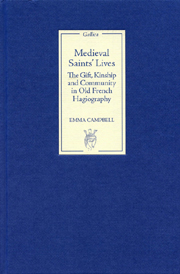4 - Marriage and Queer Desire
from Kinship
Published online by Cambridge University Press: 05 February 2013
Summary
I argued in the last chapter that the saint's relationship to God is characterized by its association with troubled forms of kinship and desire; this relationship serves both to reveal the saint's liminality with regard to human social networks and to create an alternative relational context that frames his or her identity. Whereas the example I examined in Chapter Three was incest – a form of ‘kinship trouble’ that marks by its very nature the boundaries of human social systems – this chapter considers a less obviously transgressive manifestation of troubled kinship: marriage or, more precisely, nuptial virginity. In doing so, I shall argue that depicting the saint's relationship to God through reference to more superficially unproblematic, heterosexual forms of kinship does not necessarily anchor that relationship to desires and modes of connection that fall within the boundaries of the humanly acceptable. On the contrary, the depiction of spiritual marriage, like spiritual incest, is part of an attempt to think beyond the human limits of kinship and desire to glimpse other – potentially queer – alternatives. As I will suggest at the end of this chapter, what opens the saint's relationship to God to queer possibilities is also what enables that relationship to be extended to others as a paradigm for the Christian community's own connection with God. The queer might thus be seen to emerge from the orthodox ideological aims of hagiographic texts which use marriage as a metaphor for divine union.
- Type
- Chapter
- Information
- Medieval Saints' LivesThe Gift, Kinship and Community in Old French Hagiography, pp. 96 - 118Publisher: Boydell & BrewerPrint publication year: 2008



